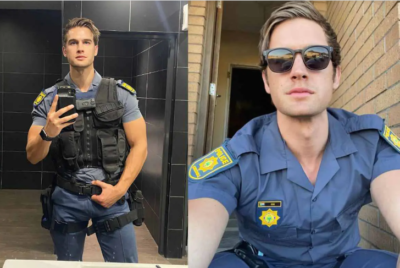In the spotlight for uniform selfies is Devan Cox, South Africa’s “Hot Cop.”
Highlights Regarding Devan Cox: From Social Media Uproar To Disciplinary Proceedings

Devan Cox, an East London, South Africa, police constable, has captured the attention of the country not just with his law enforcement work but also with his social media persona. His attractiveness and interesting posts have earned him the moniker “South Africa’s hottest cop.” But there have been difficulties with this newfound fame. Due to his social media activities, Cox has been subject to numerous disciplinary hearings. In particular, he has been under fire for uploading pictures of himself wearing his South African Police Services (SAPS) uniform online, which is against the organization’s stringent social media policy.
Cox posted a selfie in uniform on social media, which instantly went viral and attracted attention from both domestic and foreign viewers. This is how the dispute started. After the post gained a lot of attention from the media and an online following, SAPS decided to take disciplinary action. It is strictly forbidden by SAPS regulations for officers to show their uniforms or any police insignia on their personal social media accounts in order to preserve their professional image and keep their personal lives apart from their official work.
Cox’s popularity has not decreased in spite of the criticisms. His social media profiles portray the everyday activities of a charming police officer while blending his job life with personal hobbies like travel and fitness. His unique blend has won him over a lot of people, resulting in amusing remarks and broad appreciation on a number of platforms.

Cox’s circumstance brings to light a more general discussion on how those in uniformed forces should balance their personal liberties with their professional obligations on social media. It emphasizes the necessity for precise policies that permit staff members to interact positively on the internet while maintaining the morality and integrity required of them in their positions.
Cox’s narrative, which depicts the difficulties he faces in juggling his responsibilities as a public servant and a social media celebrity, is still relevant today because it highlights the need to strike a balance between personal expression and professional responsibility. His continuing story serves as a reminder of social media’s potent influence and the scrutiny that public people now endure in the digital era.